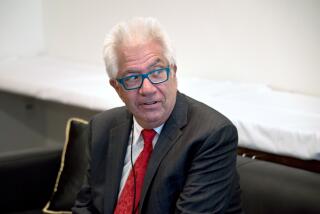R. Kleiman, 85; N.Y. Times Writer
- Share via
Robert Kleiman, 85, a journalist who worked briefly for the Washington Post before World War II, served as European bureau chief for U.S. News & World Report and wrote editorials for the New York Times for two decades, died March 22 of cardiovascular disease at his home in Washington, D.C.
Kleiman’s editorials on international affairs helped introduce a generation of Americans to the depth and complexity of politics in Europe, said Marshall D. Shulman, a former director at the Council of Foreign Relations and a former director of the Averell Harriman Institute for Advanced Study of the Soviet Union at Columbia University.
“He knew more about European-American relations than anyone else I knew,” Shulman said. “He knew almost all of the leading politicians and statesmen of Western Europe. At a time when Americans were perhaps not very adept at dealing with Europe, he wrote editorials that made European politics come to life for many people.”
Kleiman was born in New York City, and graduated from the University of Michigan in 1939. He worked for the Washington Post as a reporter from 1939 to 1941, then joined the New York Journal of Commerce as its White House correspondent.
During World War II, he served in the Office of War Information, first working as the Voice of America’s White House correspondent and later organizing the first American psychological warfare team, which operated in Burma.
After the war, Kleiman worked for U.S. News & World Report in Washington, Germany and France and for CBS as its Paris bureau chief. He joined the New York Times as a member of its editorial board in 1963.
In 1972 and 1973, he was a research associate at the International Institute for Strategic Studies in London but returned to the Times, retiring in 1983. He taught courses on U.S.-European relations at Stanford, Columbia, Union College and the University of Maryland and wrote the 1964 book “Atlantic Crisis: American Diplomacy Confronts a Resurgent Europe.”
Survivors include his wife of 30 years, Mary, and four stepchildren.
More to Read
Sign up for Essential California
The most important California stories and recommendations in your inbox every morning.
You may occasionally receive promotional content from the Los Angeles Times.












